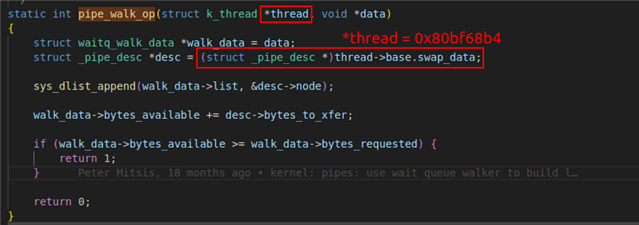Hey all,
I'm looking for a bit of guidance here to nail a bus fault that happens about 30 minutes into the program.
The message is the following:
[00:32:57.663,177] <err> os: ***** BUS FAULT ***** [00:32:57.663,177] <err> os: Precise data bus error [00:32:57.663,208] <err> os: BFAR Address: 0x80bf68c8 [00:32:57.663,208] <err> os: r0/a1: 0x80bf68b4 r1/a2: 0x20029668 r2/a3: 0x20029640 [00:32:57.663,238] <err> os: r3/a4: 0x00000040 r12/ip: 0x2002158b r14/lr: 0x0004307d [00:32:57.663,238] <err> os: xpsr: 0x91000000 [00:32:57.663,238] <err> os: Faulting instruction address (r15/pc): 0x00043d9e [00:32:57.663,299] <err> os: >>> ZEPHYR FATAL ERROR 25: Unknown error on CPU 0 [00:32:57.663,330] <err> os: Current thread: 0x20002828 (unknown) [00:32:57.724,395] <err> fatal_error: Resetting system
Reading through previous threads I found some information:
(base) PS \build\zephyr> arm-none-eabi-addr2line.exe -e .\zephyr.elf 0x4307d C:/ncs/v2.5.0/zephyr/kernel/sched.c:1959 (base) PS \build\zephyr> arm-none-eabi-addr2line.exe -e .\zephyr.elf 0x43d9e C:/ncs/v2.5.0/zephyr/kernel/pipes.c:217
That tells me that the error seems to be in one of the pipes. Additionally I found the following:
0x20029668:
0x20029640:
.noinit."../src/tasks/controller.c".0
0x0000000020028f60 0x800 app/libapp.a(controller.c.obj)
0x0000000020028f60 _k_thread_stack_controller_rx_task_tid
It seems the receiver task (controller_rx_task_tid) is causing the issue, which makes sense because that thread is related to writing to some pipes. So far I think I'm able to narrow it to where the issue is happening.
What I'm confused about and could not find any information about was:
[00:32:57.663,208] <err> os: BFAR Address: 0x80bf68c8
Is there a peripheral with that address on the NRF52840 series? I could not find that on the product specification. There are two addresses in that range that I'm not sure where they are:
[00:32:57.663,208] <err> os: BFAR Address: 0x80bf68c8 [00:32:57.663,208] <err> os: r0/a1: 0x80bf68b4
Any suggestions or additional information you can give me that could help me search for other things is appreciated.
Cheers,
Alberto



